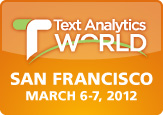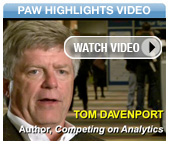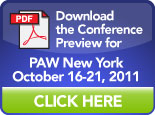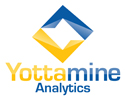Workshop sponsored by:

Workshop
Friday October 21, 2011 in New York City
Full-day: 9:00am - 4:30pm
Room: Nassau A
Deploying User-Friendly Predictive Analytics: Delivering Results to Business Users with Interactive Applications
Intended Audience:
- Practitioners: Analysts who would like to create interactive, predictive analytics applications in an agile way, without the limitations of traditional IT-heavy, waterfall processes.
- Technical Managers: BI Architects and leaders of analytics teams who would like to bring efficiency to their development teams by allowing their customers to ask and answer some of their own questions.
- Knowledge Level: Familiar with the basic concepts of predictive modeling. Some familiarity with R will allow you to go deeper.
Knowledge Level: Moderate background with predictive analytics. The workshops
R Bootcamp and R for Predictive Modeling, earlier in the same week, provide strong background for this workshop, although no hands-on experience with R is required.
Workshop Description
Businesses that win in volatile environments rely more on insight than intuition. To this end, business users must rely on predictive analytics applications to make better, more data-driven decisions.
Too often, however, valuable analytical results -- such as those derived with R, the leading open-source analytical platform -- are not communicated successfully to business users, who require clarity and support as non-experts. Analytical experts generally do not have the resources or tools to deliver their data-driven capabilities in an interactive, user-friendly form so that their customers may ask and answer questions on their own.
The challenge of communicating analytical results is often a primary roadblock in broadening the deployment of predictive analytics at any organization. These organizations often fail to extract value from their IT-centric data collection efforts, as their projects become mired by the overhead of defining requirements, hiring engineering and data mining experts, and developing targeted business applications. Typically, business conditions have changed by the time systems are in place.
In this hands-on workhop, you will gain experience building user-friendly predictive applications that quickly operationalize analytical models developed in R, serving these capabilities to end business users. Example applications covered include:
- Predicting Cross-Sell opportunities with classification trees
- Revenue and Price Forecasting with time series.
Workshop participants will employ a leading software solution designed for the agile development of interactive, predictive analytics applications: Spotfire. You will learn how to rapidly prototype and operationalize predictive applications using this platform's highly interactive visualizations, while still fully leveraging the breadth of analytics available through the R language. Suitable for sharing with a wider audience of non-programming business analysts, these analytic applications allow decision makers to do their own "what-if" scenario analyses, while allowing practitioners to ensure statistical rigor by controlling the extent to which model parameters are exposed.
Schedule
- Workshop starts at 9:00am
- Morning Coffee Break at 10:30am - 11:00am
- Lunch provided at 12:30 - 1:15pm
- Afternoon Coffee Break at 2:30pm - 3:00pm
- End of the Workshop: 4:30pm
Instructor
Jeff Mergler, Lead Statistical Applications Trainer, TIBCO Spotfire
Jeff Mergler is an analytics field engineer at TIBCO Spotfire where he specializes in helping organizations implement custom analytics that are flexible in a changing environment. He has enjoyed success turning innovative research ideas into automated and deployable applications. These applications include uplift modeling, revenue forecasting, default/fraud prediction, and text data mining of social networking websites. He currently leads statistical applications training development including the use of S+ and R with Spotfire. Previously, he taught mathematics, developed BI systems, and managed IS teams and infrastructure. Jeff earned his MS in Statistics from Colorado State and his MA in Information Systems from Webster.
*Rooms are subject to change























































